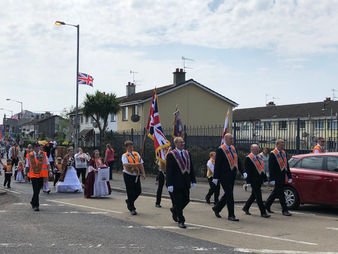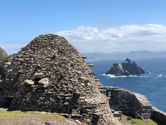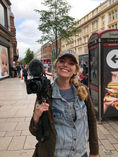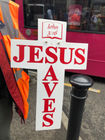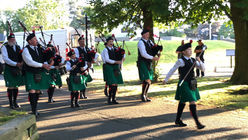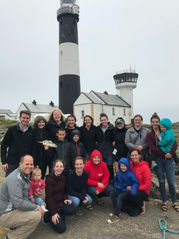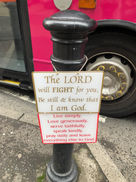
2023 Northern Ireland
Visual Anthropology Field School
Location: Belfast, Northern Ireland
Dates: June 4 - August 12 (approx.)
For full consideration, please apply by November 15th, 2022
If you were not able to attend the information meeting, you can see an archive of it at this Youtube Live Event Page.
DETAILS
Northern Ireland is a deeply divided society with a rich—but also troubled—history of religious, political and ethno-national conflict. This ethnographic field school will involve two elements: 1) training students in the research methods of visual anthropology, including film, photography, and sound; and 2) studying contemporary religious and political life in Belfast, Northern Ireland. The research component will involve students receiving intensive training in visual anthropology and ethnographic research methods. Students will use this training and become embedded in religious communities in Belfast, where they will apply their training in visual anthropology by collecting data (interviews and participant observation) in these communities. In order to supplement this ethnographic study of religious life in Northern Ireland, students will also receive formal instruction on the historical, political, and cultural contexts of Northern Ireland. This portion of the program will involve learning about the history of the “Troubles” in Northern Ireland, as well as its ‘post-conflict’ present. This program includes a series of guest lectures ranging from academic experts on the conflict to members from key social and political institutions on both sides of the sectarian divide. Students will visit key historical and cultural sights, both around Belfast and in other parts of Northern Ireland as part of their research and instruction. This program will integrate this training in conflict transformation with the day-to-day ethnographic research that students are conducting with religious communities around Belfast. Students will have the opportunity to work closely with faculty in this research process, and will collaborate to produce visual anthropology scholarship (film, photographic essays, soundscapes, etc.) based on this research.
We are currently seeking applicants for student members of the research team. We will be spending approximately ten weeks conducting fieldwork, but the team will also coordinate research planning together before the field to prepare for fieldwork, as well as after the field to work towards publishing the results, for those who wish to pursue this project further. The program is run through the Department of Anthropology at Brigham Young University, and students will get anthropology course credit through BYU (which can potentially be transferred elsewhere). The thrust of this program is on learning and applying visual/sonic ethnographic research. Coursework will therefore include credit for the training and research conducted on the program.
Students who participate in this program and complete the suggested pre-requisite course (Anthr 101, which also fulfills 2 GE requirements) will have fulfilled all of the requirements for an Anthropology minor at BYU.

Why Visual Anthropology?
Visual anthropology employs a general ethnographic approach, but focuses on media beyond the written word (e.g., film, photography, sound) in order to portray or depict different contexts of human experience. Northern Ireland is a rich, visually stimulating place, and this particular field school will emphasize "multimodal" approaches to both understanding and depicting contemporary religious and political life. That is, our methods of data collection and depiction will reach beyond the written word, to what Lucien Taylor calls "thick depiction." Thus, students will be trained dually in the broad research approach of ethnography, but also more specifically in visual anthropology methods of ethnographic engagement and depiction using film, photography, and sound.
Past Programs
In past years, Dr. Jacob Hickman has directed sessions of the field school in Northern Thailand in 2012, 2013, 2017 and 2022; in China and Vietnam in 2015; in France in 2016; and in Northern Ireland in 2018. This research program will provide grounded ethnographic training to the student members of the research team while we conduct cutting-edge research on theoretically innovative topics. Students will receive mentored training in ethnographic research (including a broad array of social science methods) and use these skills to conduct fieldwork on various topics. This program is based in the Department of Anthropology at Brigham Young University, but this experience is relevant to a wide variety of research interests including film and photography, area studies, folklore, history, law, linguistics, music, philosophy, political science, psychology, religious studies, and sociology.
WHAT IS A FIELD SCHOOL?
A field school is a particular type of study abroad program that focuses on a mentored research experience in the communities where the field school is held. While all study abroad programs seek to integrate classroom learning with the resources available in the host country, field schools emphasize learning and applying research skills in order conduct fieldwork and to answer scholarly questions in various disciplines. Thus, the emphasis in a field school is on the research experience itself, rather than just mastering a body of content. Field school students design and conduct research projects under the mentorship of the program faculty. In other words, as students receive training they are also fully participating members of the research team. This includes learning and applying skills of data collection and analysis in order to address the research question. In addition to the cultural immersion experience, students come out of field school programs with valuable research and analysis skills (which go beyond the typical undergraduate training) that can be applied to a wide variety of disciplines and fields. For students looking to conduct original fieldwork for a thesis, this program offers an immersed fieldwork experience where one can draw upon the contact base and resources of the directing faculty to conduct thesis research.

PROGRAM DETAILS
This program will last 10 weeks and will be located in Belfast, Northern Ireland. Students will be embedded in religious communities in Belfast. This immersive experience will facilitate the ethnographic research that we undertake during the summer. Regular lectures and discussion will provide the basis of the in-field training, but we will also attend community events and religious services together as team members as we collect and analyze data collaboratively.
PREREQUISITES
Accepted students are required to participate in ANTHR 390R Field School Prep (1 credit hour). This course will be held during winter semester 2023. Dr. Hickman will be teaching ANTHR 490R Visual Anthropology during winter semester 2023, and this course is a prerequisite for the program. It is also recommended that students take ANTHR 101 Social/Cultural Anthropology before participating in this program.
IN-FIELD COURSEWORK
Undergraduate students will typically take 12 credit hours during the Spring/Summer program from the following courses:
ANTHR 390R Culture & History of Northern Ireland (3.0 credit hours)
ANTHR 430 Moral and Ritual Institutions (Anthropology of Religion) (3.0 credit hours)
ANTHR 495R Ethnographic Field Project (6.0 credit hours)
BYU students who participate in this program and complete the suggested pre-requisite course (Anthr 101, which also fulfills 2 GE requirements) will have fulfilled all of the requirements for an Anthropology minor.
Critically, all coursework in the program is centered around the research training and gaining theoretical and methodological knowledge that pushes the research forward. Participants will be registered as BYU students, and will receive BYU course credit. Students will be responsible for transferring credit to their home institutions, but the director can assist by providing syllabi or other course materials and justifications for students to arrange the transfer.
WHERE DO STUDENTS LIVE?
Housing will be arranged as part of the program. Students will stay at Queen's University housing or with host families.
HOW MUCH DOES THIS PROGRAM COST?
-Approximately $7,000-$7,500
-The program fee includes the following expenses: LDS full-time tuition for the corresponding coursework (typically 12 credits, or a regular semester course load); lodging; international health insurance; and group travel.
-The program fee EXCLUDES (expenses students will take care of on their own): Airfare to and from Northern Ireland; most meals; personal travel.
APPLICATION PROCESS
The application deadline is November 15th. In order to apply, click here and start an application (for non-BYU students this link includes instructions on setting up a BYU NetID). Select the NORTHERN IRELAND VISUAL ANTHROPOLOGY FIELD SCHOOL program for Spring/Summer 2023.
The application steps include:
1) Submit the supporting documents online.
2) Include the following in your letter of intent: Why you are interested in this program, the nature of your interest in religion and conflict transformation in particular, how this program would relate to your course of study, and please also describe any prior research experience and any other international experience that you may have.
3) Pay the application fee (the fee is collected by the Kennedy Center, which administers the application database).
4) Once the online application is complete, applicants will formally interview with the program director. Students will be notified via email if they are accepted to the program.
Further information can be found at the above site or by contacting Dr. Jacob Hickman at jhickman@byu.edu.





